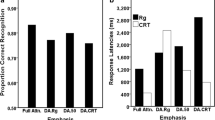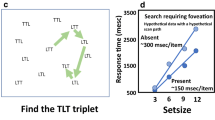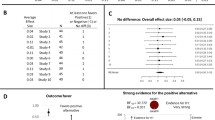Abstract
We describe the complex pattern of spared and impaired performance observed in a neurologically impaired subject on a number of letter processing tasks including: written letter naming, alphabetization, matching across typecase and font, oral and written spelling to dictation, and across-case letter priming. The observed dissociation in performance between the naming of written letters and the naming of letters in oral spelling as well as the dissociation between oral spelling and written spelling are shown to support a model of letter processing in which a distinction is drawn between visuo-spatial and abstract levels of letter representation. We also describe symmetrical deficits in the reading and writing of letters. These can be understood: in reading, as the result of an impairment to the processes which mediate the conversion of visuo-spatial letter representations to abstract representations, and in writing, as a deficit to the processes which negotiate the apparently reverse operation. This finding is interpreted within the context of the notions of neural and functional proximity and we raise the possibility that processes which perform distinct computations may, nonetheless, share certain computational resources.
Similar content being viewed by others
References
Beauvois, M. F. and Derouesne, J. 1981. Lexical or orthographic agraphia. Brain, 104, 21–49.
Blake, R. R., Fox, R. and Lappin, J. S. 1970. Invariance in the reaction time classification of same and different letter pairs. Journal of Experimental Psychology, 85, 133–137.
Boles, D. B. and Eveland, D. C. 1983. Visual and phonetic codes and the process of generation letter matching. Journal of Experimental Psychology: Human Perception and Performance, 9, 657–673.
Caramazza, A. C. 1988. Some aspects of language processing revealed through the analysis of acquired aphasia: The lexical system. Annual Review of Neuroscience, 11, 395–421.
Caramazza, A. and Berndt, R. S. 1985. A multicomponent deficit view of agrammatic Broca's aphasia. In M. L. Kean (ed.), Agrammatism. London: Academic Press.
Dainoff, M. J. 1970. Time course of visual and auditory encoding. Journal of Experimental Psychology, 86, 214–224.
Dainoff, M. J. and Haber, R. H. 1970. Effect of acoustic confusability on levels of information processing. Canadian Journal of Psychology, 24, 98–108.
Evett, L. J. and Humphreys, G. W. 1981. The use of abstract graphemic information in lexical access. Quarterly Journal of Experimental Psychology, 33A, 325–350.
Gilmore, G. C., Hersh, H., Caramazza, A. and Griffin, J. 1979. Multidimensional letter similarity derived from recognition errors. Perception and Psychophysics, 25, 425–431.
Goodglass, H., Klein, B., Carey, P. and Jones, K. 1966. Specific semantic word categories in aphasia. Cortex, 2, 74–89.
Haber, R. N. and Cole, R. A. 1980. Evidence for direct visual access to letter identities. Acta Psychologica, 46, 181–192.
Kinsbourne, M. and Rosenfield, D. B. 1974. Agraphia selective for written spelling. Brain and Language, 1, 215–225.
Kinsbourne, M. and Warrington, E. K. 1965. A case showing selectively impaired oral spelling. Journal of Neurology, Neurosurgery and Psychiatry, 28, 563–566.
Kosslyn, S. M. 1981. The medium and the message in mental imagery: A theory. Psychological Review, 88, 46–66.
Martin, R. C. and Caramazza, A. 1982. Short-term memory performance in the absence of phonological coding. Brain and Cognition, 1, 50–70.
McCloskey, M., Sokol, S., Goodman-Schulman, R. and Caramazza, A. (in press). Cognitive representations and processes in number production: Evidence from cases of dyscalculia. In A. Caramazza (ed.), Advances in Cognitive Neuropsychology and Neurolinguistics. Hillsdale, NJ: Erlbaum.
Posner, M. I. and Keele, S. W. 1967. Decay of visual information from a single letter. Science, 158, 137–139.
Posner, M. I. and Mitchell, R. F. 1967. Chronometric analysis of classification. Psychological Review, 74, 392–409.
Rapp, B. C. and Caramazza, A. (in press). General to specific access to word meaning: A claim reexamined. Cognitive Neuropsychology.
Schneider, W. and Shiffrin, R. M. 1977. Controlled and automatic human information processing: I. Detection, search and attention. Psychological Review, 84, 1–66.
Scarborough, D. L., Cortese, C., and Scarborough, H. S. 1977. Frequency and repetition effects in lexical memory. Journal of Experimental Psychology: Human Perception and Performance, 3, 1–17.
Seidenberg, M. S. Waters, G. S., Barnes, M. A., and Tannenhaus, M. K. 1984. When does irregular spelling or pronunciation influence word recognition? Journal of Verbal Learning and Verbal Behavior, 23, 383–404.
Seidenberg, M. S. and McClelland, J. (in preparation). Visual word recognition and pronunciation: A computational model and its implications.
Warrington, E. K. and Shallice, R. 1979. Semantic access dyslexia. Brain, 102, 43–63.
Author information
Authors and Affiliations
Additional information
Requests for offprints should be addressed to Brenda Rapp or Alfonso Caramazza. The research reported in this paper was made possible through the support of NIH (NINCDS) NS22202 and the Seaver Institute. We would like to express our appreciation to J. E. for his participation in this study and we thank Roberta Ann Goodman-Schulman and Cristina Romani for their helpful comments and Paul Mullin for his generous programming assistance.
Rights and permissions
About this article
Cite this article
Rapp, B.C., Caramazza, A. Letter processing in reading and spelling: Some dissociations. Read Writ 1, 3–23 (1989). https://doi.org/10.1007/BF00178834
Issue Date:
DOI: https://doi.org/10.1007/BF00178834




